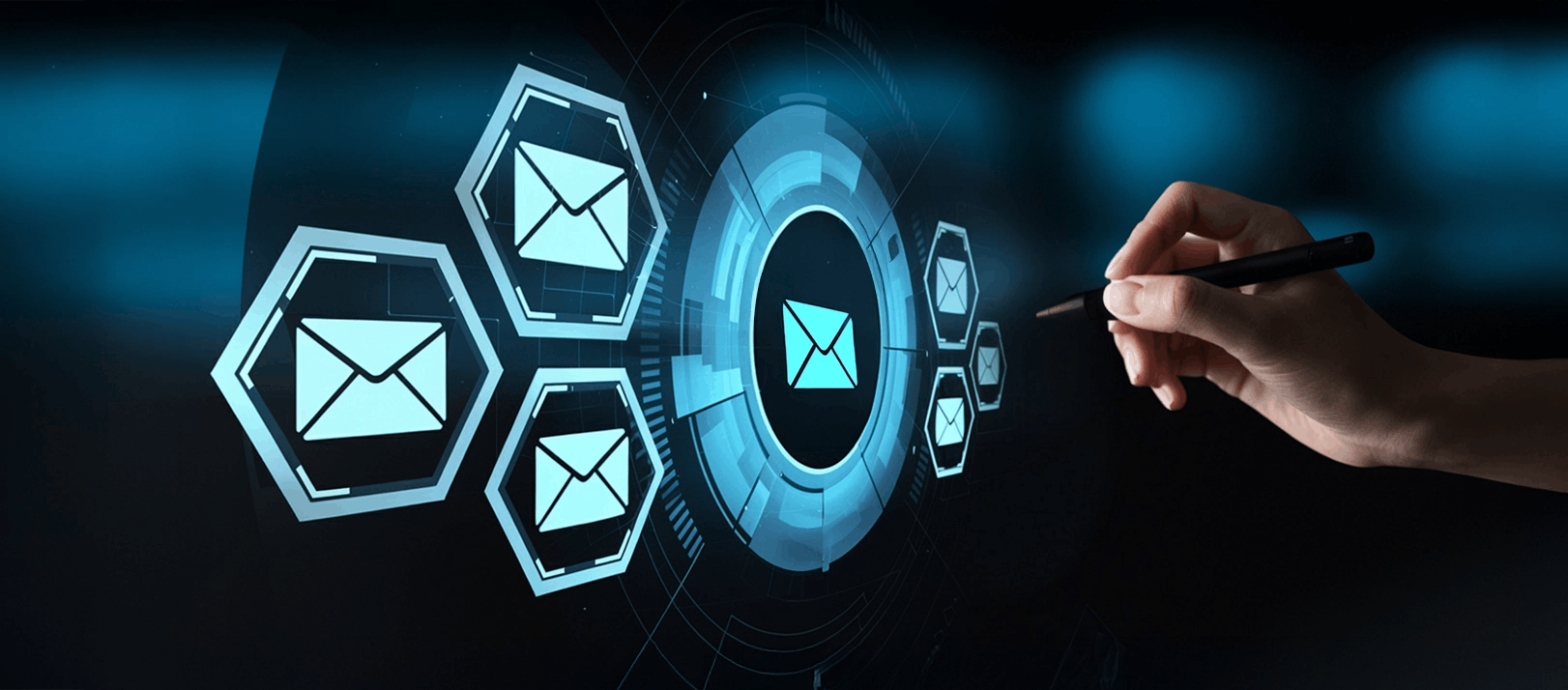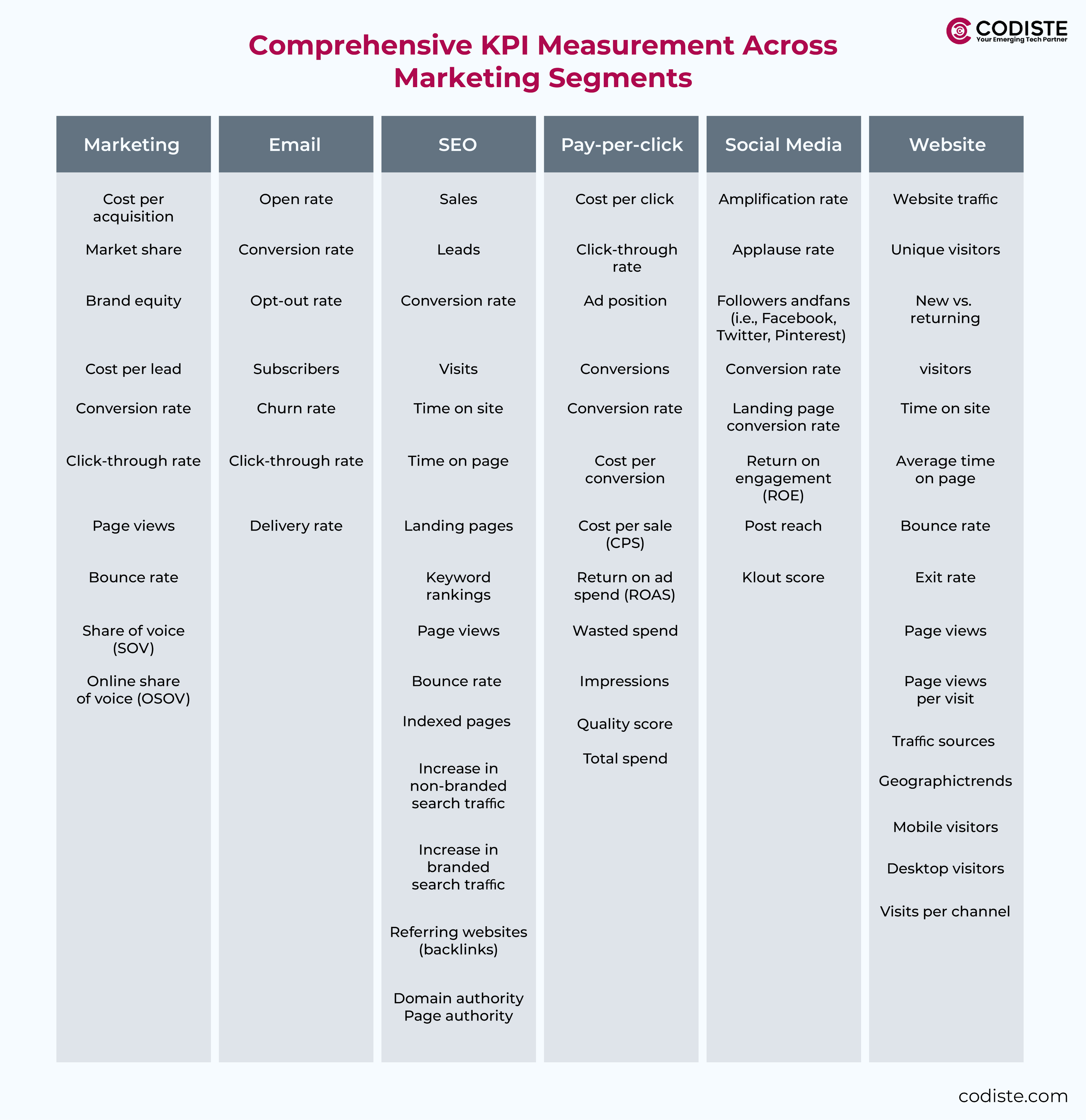
,
Marketing is the primary determinant of success in business in the highly competitive marketplace of today. Thanks to artificial intelligence (AI) technology, the evaluation of AI marketing ROI measurement has become an imperative practice in a business marketing strategy. The question remains, however, how do we know if these tools are working? The fact of the matter is that using the correct key performance indicators (KPIs) solves the issue.
This article will outline the KPIs of marketing as well as their relevance and the top 12 KPIs of the AI marketing tools to track AI tool effectiveness measures for marketing.
Let’s Understand the Concept of Marketing KPIs
The Key Performance Indicators (KPIs) are particular quantifiable measures that help companies monitor progress towards a particular goal. Marketing utilizing KPIs essentially means finding out which campaigns are the most effective, how the audience interacts, and the company's ROI. Marketing KPIs involve many things and can have an effect in different areas like lead generation, customer acquisition, engagement, and conversions.
Why Are Marketing KPIs Important?
Marketing KPIs help businesses in the following ways:
Measure Success
To measure whether marketing efforts are effective, one of the most effective ways is to evaluate KPIs. For example, companies can measure visitor numbers with KPIs like they set out to increase the website traffic by 20% in three months. They would simply have to get the visitor numbers and compare the total in the past and present to check the goal realization process.
Optimize Campaigns
KPIs serve as a valuable tool for businesses by pointing out both the positive and negative attributes of their strategies and thereby enabling them to make the necessary adjustments that are data-informed.
For example, if a marketing email campaign has a low open rate, the marketing team can rely on KPI data to change the email subject lines or content. This ongoing improvement leads to email marketing delivering better results in the long run.
Align Teams
KPIs help bring the marketing and sales teams into perspective by setting performance goals that the two departments can work towards. When both departments are concentrating on common KPIs, such as conversion rates or lead quality, they can work better together. This consistency results in a better output.
Proven ROI
Marketing teams provide clear data that helps stakeholders to understand the significance of their activities. Often, companies are requested to provide explanations about the effectiveness of their marketing expenses to executives or investors. Through direct tracking of return-on-investment KPIs, companies can indicate directly how marketing activities are helping the company to grow.
KPIs are the core of the company and without them, they are lost in a market where it is difficult to measure the progress or validate the marketing expenses.
The Importance of Metrics in AI Initiatives
Marketing tools powered by AI facilitate automation, data insights, and efficiency. Let us find out why metrics for assessing AI in digital marketing are important in AI initiatives:
- Data-Driven Decisions
Marketing automation metrics can be used by marketers to base decisions on data rather than working under mere assumptions. - Performance Improvement
Regular tracking assists in finding out AI tools' weak points and thus, how they can function better. - Customer Insights
AI marketing Key Performance Indicators (KPIs) bring out the customer behavior patterns and preferences. Thus, personalized marketing strategy can be developed to meet the needs and wants of the target audience. - ROI Calculation
The use of precise Marketing AI performance metrics in campaigns allows companies to assess the AI's impact on financial planning.
Looking for AI marketing tools to measure KPIs?
12 AI marketing KPIs to Measure Performance and Growth
Below are 12 KPIs that the companies must keep an eye on to measure the profitability achieved using AI marketing tools:
1. Customer Acquisition Cost
CAC indicates how much a new customer costs. With AI marketing tools, this metric often decreases because of more accurate targeting and the use of automation.
Why It Matters
The reduction in CAC gives companies the liberty to manage their money effectively and release resources for other marketing projects. Integrated AI-powered tools with automated lead nurturing strategies led to a 20% decrease in CAC for an email campaign done by a retail company.
2. Return on Investment
ROI is a financial return from marketing activities. Its level is compared to the investment made in those activities.
Why It Means
ROI tracking is the tool that businesses use to measure if their marketing strategies are producing positive results or not. Using AI-powered personalization, an e-commerce brand was able to increase their sales by 30%, hence their ROI has become much higher.
3. Conversion Rate
Conversion rate is a measure of the number of users who have completed a particular action, such as making a purchase.
Why It Matters
Conversion rates being higher means that marketing initiatives are influential in driving user actions.
For example A retailer's conversion rate was increased by fifteen percent by using AI-based recommendation engines.

4. Click-Through Rate
CTR is interpreted as a function that signifies how often viewers are clicking on a particular hyperlink in a campaign when compared to the total number of views.
Why It Matters
A higher CTR is an indicator that the material is engaging and that it is attracting the users׳ and users’ interest.
Example: The placement of AI-generated ads resulted in a 25% rise in CTR.
5. Engagement Rate
One of the KPIs used in measuring AI marketing success is engagement rate. It evaluates how resourcefully users interact with marketing content, e.g., by posting on social media or running email campaigns.
Why It Matters
High engagement tells us that the content aligns with the audience's interests. To schedule the best post time, a business employed AI to increase social media engagement by 40%.
Read more:
How AI-Powered Video Editing Tools Are Revolutionizing Video Translation and Localization
AI Powered Email Marketing: A Comprehensive Guide
Mastering AI Agents in Marketing and Boosting Brand Growth
Top 5 Marketing Challenges AI Agents Can Solve in 2025
How AI Agents Automate & Optimize Your Marketing Efforts
6. Customer Lifetime Value
CLV is a customer's worth over the entire relationship. i.e. an estimate of the whole customer's worth over the entire relationship.
Why It Matters:
Growing CLV is the result of longer customer retention and an increased amount of money spent with the company. An artificial intelligence app in customer segmentation led to an 18% improvement in CLV for a subscription service through customized offers.
7. Lead Scoring Accuracy
It can be quite challenging to know which leads have the greatest chance of converting. What lead scoring does is make certain that the system identifies potential leads in the best way possible.
Why It Matters:
Identifying leads of high quality is key to higher company sales. A B2B company experienced a rise in sales efficiency of 30% after incorporating AI-driven lead-scoring technology.
8. Churn Rate
This is a measure that shows the rate of customers who stopped doing business with a company.
Why It Matters:
Decreasing churn is an effective way for companies to retain customers of high value. The customer service AI system was designed to be proactive about the problems and lowered the churn rate by 15%.
9. Email Open Rate
This KPI tracks the share of the target audience, which opens promotional emails.
Why It Matters
Email campaigns with higher open rates mean that the email can catch the attention of the audience. By implementing AI to generate personal subject lines, a SaaS firm boosted its email open rate by 20%.
10. Cost Per Click
CPC means the cost of a single click in paid advertising campaigns.
Why It Matters
The more the CPC decreases, the cheaper the paid campaigns get. The digital marketing company saw a 25% CPC decrease due to the new AI-based bidding strategies.
11. Sales Revenue Attribution
This metric will show us which marketing activities help contribute to sales.
Why It Matters: Being able to segment spending on higher performance channels cuts costs and ensures that each dollar is wisely used to improve the company's performance. Retailers found that their digital marketing campaign was responsible for a sales spike of 22% through AI analysis of their attribution data.
12. Predictive Analytics Accuracy
AI models typically tend to use predictive analytics for the estimation of trends and customer behavior.
Why It Matters
Correct anticipations permit the monopoly businesses to anticipate future demand and the need to be met by the customer. A strategic marketing AI that was commissioned for seasonal forecasting helps a retailer achieve a sales increase of 15%.
Conclusion
Measurement of AI marketing tools and their impact on business growth is very crucial. The companies are in a good position to improve their strategies, customer engagement, and ROI by tracking the right KPIs. The 12 KPIs provided in this piece of content offer a strong first step in the evaluation of AI marketing performance metrics. Companies that have data-driven decisions will have a great chance of being on the top and having long-term growth.
Looking for expert AI solutions for your business? Get in touch with Codiste, who have an experienced team that specializes in developing AI-powered marketing tools. Codiste’s developed marketing tools can improve customer engagement and boost sales. They make sure to deliver solutions that will help you to save both time and cost.




